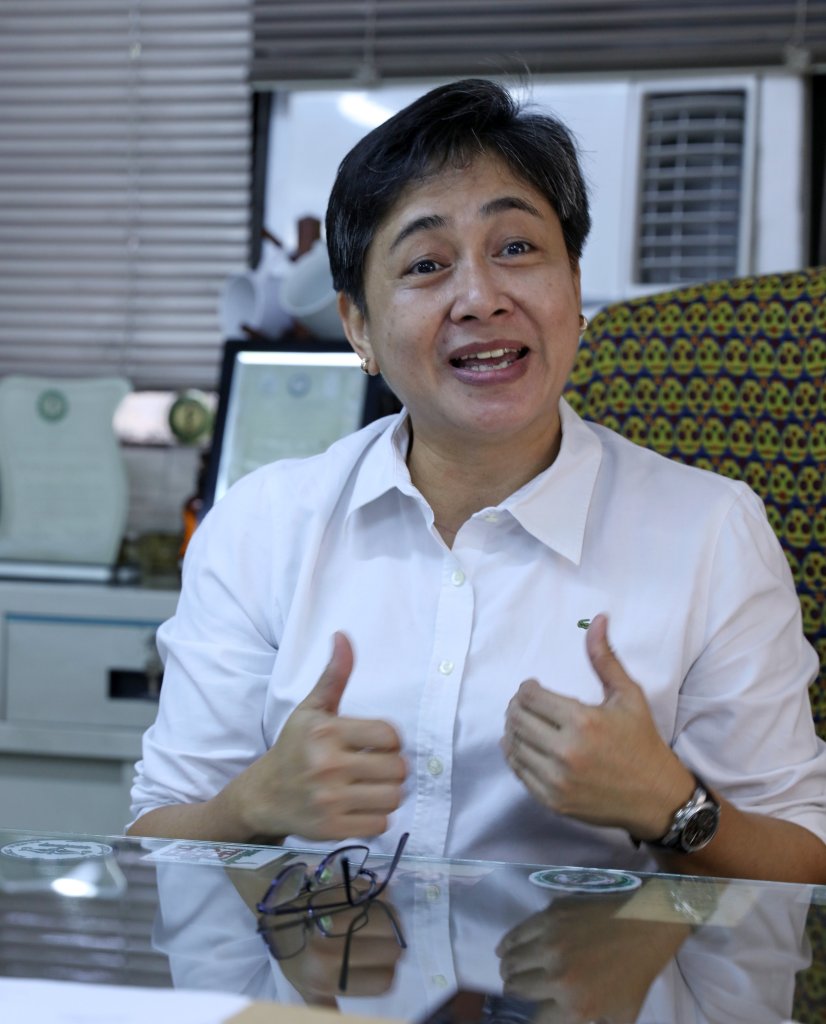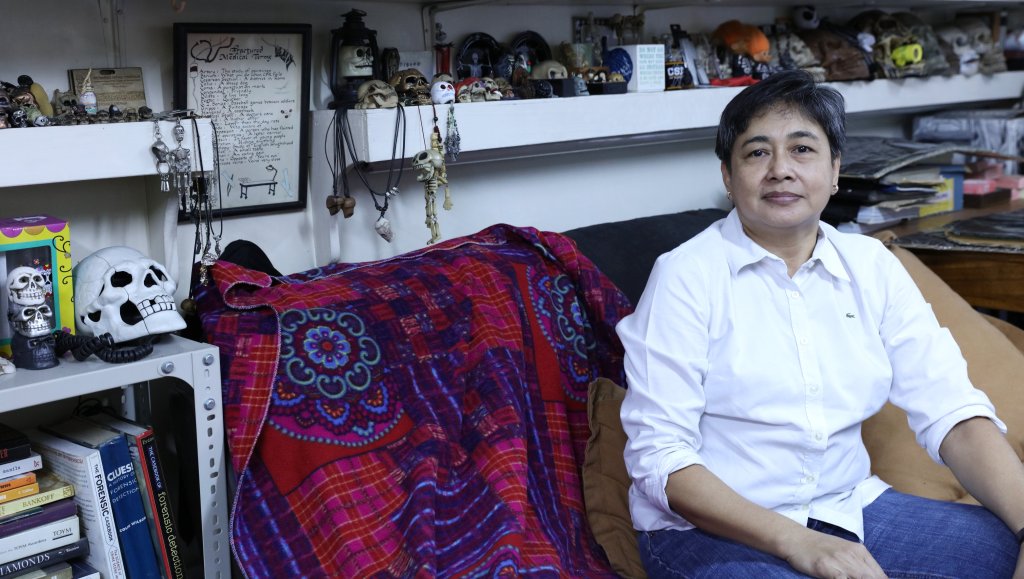by Arlyn VCD Palisoc Romualdo, UP MPRO
She always cleaned the fish her mother Amelia bought. It was a chore she loved doing. Little did the young Raquel Barros Del Rosario know she was preparing for a future as Dr. Raquel B. Del Rosario-Fortun, the first Filipino woman forensic pathologist.
“Evisceration! That’s what it was,” she said with a knowing smile, connecting that childhood task with disemboweling bodies during autopsies. She had always wanted to become a doctor despite coming from a clan of lawyers and admitted that her father Benjamin was “a bit disappointed.”
It was her doting aunt, Dr. Lourdes Del Rosario, who inspired Raquel. Her photo is the only one on Raquel’s desk at the Department of Pathology chairperson’s office, UP Manila College of Medicine (UPCM). “Because of her, I associated fun with being a doctor.” Even going with her to a hospital in Tondo, Raquel wasn’t fazed. “That hospital smell didn’t bother me. I saw all these doctors in white coats like her, respected by everyone. I thought it was so cool.”

Dreams vs. reality
Going into college, she wanted something that could be a pre-med degree but could also guarantee employment if she couldn’t pursue medicine because it was expensive.
She enrolled in the UP Diliman (UPD) BS Psychology program in 1979 after graduating from the UP Integrated School. Three years on, she felt certain she wanted to be a doctor. She “wanted to shift to a pre-med program focused on the sciences like Biology or Zoology,” but chose to be more practical and finished psychology.
Raquel wasn’t accepted to UPCM, so she went to the University of the East Ramon Magsaysay (UERM) College of Medicine, graduating in 1987 and completing post-internship in 1988. She began residency training in anatomic and clinical pathology in 1989 at UPCM, where she was also made instructor.
The medicine-law mix
While the pull of medicine was stronger, law was also Raquel’s interest. She saw the possibility of mixing both through Dr. Pedro Solis, a lawyer-doctor and her UERM Legal Medicine professor.
She took and passed the law aptitude exam of the UPD College of Law (UP Law) twice, in 1989 and 1993. UPCM just advised against the pursuit in 1989 because it was her first year of residency. “Passing twice, I thought I might have an aptitude for law after all.”
Raquel laughed when recounting her law experience. “I quit! After 10 days, maybe 2 weeks, I just quit! This is so embarrassing, but that’s what happened. Law wasn’t for me.” She found it “too abstract, the opposite of medicine’s tangible and concrete.” She may have quit, but more than ten years later, she was invited by UP Law to teach. “I believe some eyebrows were raised, that I, a non-lawyer, was teaching a course at UP Law.”
She learned about forensic pathology from one of her seniors at the department. “I realized it was probably what I was looking for: the field of medicine, particularly pathology, applied to law. The tangible applied to the abstract.”
Raquel went to Seattle, Washington in 1994 to train at the King County Medical Examiner’s (ME) Office. “My first day there, I fell in love with forensic pathology. That was it. I knew it was the field I was meant to be in.” She had the stomach for it, too—dead bodies, whether fresh or decomposing, with maggots or reduced to skeletal remains.
Heartaches and headaches
She vividly remembers the day she left. It was a Sunday. She and her husband Vincent, an obstetrician-gynecologist, left their three-year-old daughter Lisa playing at her paternal grandmother’s place. Raquel cried so hard the night before that she almost didn’t want to leave. “It was very difficult.”
When she wasn’t examining bodies and collecting evidence at the ME’s office, Raquel would feel terribly homesick. She racked up a massive bill on overseas calls in her first month and was forced to cut down—ten minutes on Saturdays.
She thought things would be easier when she returned. “It was like my daughter didn’t know who I was. That hurt.” Raquel feared her one-year absence may have caused trauma on Lisa. “What have I done?” she asked herself many times.
Professionally, she was full of enthusiasm because of everything she had learned. “But there was no solid practice for a forensic pathologist here. I’ve seen the ideal and I wanted us to be at par with international standards.” That desire for improvement, however, wasn’t welcomed by some in the medical field and government.
“We didn’t have a death investigation system here that was fully state-funded and independent from law enforcement. We didn’t have medical examiners or coroners, and medical investigators. We still don’t. Have I cried over this? Yes, out of sheer frustration at how death investigations were being done.”
Raquel continued teaching. Over the years, she has been asked to consult on cases, some of them high profile and controversial: the Ozone Disco fire, the Dacer-Corbito case, the Asian Spirit tragedy, the Maguindanao massacre, and the death of Ted Failon’s wife, Trina Etong. Her popularity as an expert grew, but so did the number of her enemies. “Evidence doesn’t take sides. It is what it is. If you don’t like what it tells you, that’s not my fault. I just call it as I see it. That’s how the science works.”
She clarified that she never claimed to be an all-around forensic expert. “Forensics involves a lot of disciplines. Mine is forensic pathology. Although my training has exposed me to other forensic aspects of death investigation, I always defer to experts in other forensic fields. I know my limitations.”

Choosing to stay
Forensic pathology is a lucrative field and Raquel could be earning so much more if she worked abroad, in full practice, and did part-time teaching. “My fate is here, teaching full-time as a UP professor and doing cases on the side,” she said. “I’m ten years from retirement.”
She has tried working outside, where the monthly pay was twice her teacher’s annual salary. “But I wasn’t happy. I realized it wasn’t about the money. UP has an environment that’s hard to find elsewhere. I am free to speak my mind. The students are very intelligent. The interaction with my colleagues is great.”
As for the future of forensic experts and forensic pathology in the Philippines, she hopes that coming generations will have an easier time; that funds for material and human resources would be given to support a UPM forensic pathology fellowship program; that the UP Board of Regents-approved establishment of the Forensic Science Institute in 1999 would materialize; and that a death investigation system fully supported by the state, independent of law enforcement, free from politics, unbiased, and unafraid to expose the truth would finally exist.
Until then, Raquel will just do the usual:
Try to beat the morning rush. Drink coffee in the car when she arrives too early and too afraid to enter the dark building, even with a guard on duty. Do administrative work. Teach. Maybe do an autopsy. Stay in her real office—the one with creaky wooden floors, a huge collection of crime novels, shelves full of skull/skeleton figures, and that old and frayed yet comfortable couch. Endure evening traffic.
On weekends, garden or buy plants. Listen to her CDs. Perhaps be the “HandyMa” and visit her favorite hardware stores for do-it-yourself projects. Along with Lisa, take care of her mother and do household chores.
And at any given time, tweet as @Doc4Dead.
Source: https://www.up.edu.ph/index.php/this-doc-sees-dead-people
